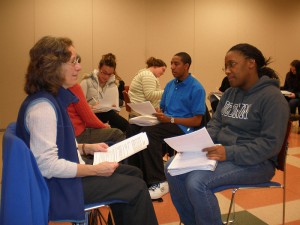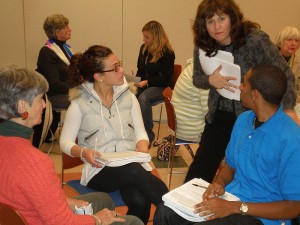
The Osher Lifelong Learning Institute (OLLI) at the Waterbury Campus offers learning opportunities for those over 50. But the program is having an impact on younger learners as well.
The Institute, which is sponsored by the Bernard Osher Foundation, offers nearly 40 non-credit courses in areas including the arts, computers, culture and language, health and wellness, and history, for retired and semi-retired adults from more than 65 towns and cities in Connecticut.
One of 122 OLLI programs nationwide, it is one of about eight with an emphasis on intergenerational learning, according to Laura Donorfio, an assistant professor of human development and family studies in the College of Liberal Arts and Sciences who invites OLLI students to join her undergraduate classes.
Although the majority of OLLI courses are self-contained in four, six, and eight-week modules, OLLI students are also welcomed into some traditional 14-week classes during the spring and fall semesters, as space allows. Here, they study alongside undergraduate students and are expected to complete all course assignments. The only difference is that they do not earn course credit for their efforts.
Donorfio says the program helps break down stereotypes. While undergraduates are initially not used to having older students in their classrooms, over time, “negatives start to get positive, with a transformation appearing mid-semester,” she says.
Allison Tartaglino, a junior majoring in human development and family studies, says that sharing the classroom with older students introduces new ideas and new perspectives. And, she adds, “Very often it is the older students who are listening to what the younger students have to say.”

A recent class project for undergraduates taking Donorfio’s course on Adulthood and Aging required each student to interview a participant in the OLLI program. The purpose was twofold: to give undergraduates the experience of talking with older adults, and to help create a database to chronicle the history of the OLLI program at Waterbury. The project was presented to OLLI students as an opportunity to ‘tell your story’ as it relates to lifelong learning.
According to OLLI program director Brian Chapman, more than 35 OLLI members and approximately 50 students took part.
Lauren Miele, a senior majoring in sociology, says that intergenerational learning has been fun and eye opening. “It is always interesting to hear the OLLI member stories and [listen to] their take on things which sometimes seems a little ‘old school.’ It makes for some good laughs though. They are very eager and happy to be there, and I think the OLLI program is a fabulous way to utilize brain power into older age.”
One OLLI interviewee was Sandra Noel, director of congregational care and senior ministry at Bethany Covenant Church in Berlin, Conn. She has also been a presenter in Donorfio’s Adulthood & Aging class, talking about spirituality in older adults, and giving an introduction to life story work.
Says Noel, “It was a rewarding and joyful experience for me to be interviewed by a student who was genuinely interested in my viewpoints and story. I had shared some life-story interview ‘how-to’s’ in my class presentation, and it was delightful to experience those ‘how-tos’ at work, as my [undergraduate] interviewer created a casual yet mutually sharing environment.”
Another intergenerational opportunity is the chorus, Musica Scolara. The group welcomes OLLI members, as well as undergraduates, faculty, staff, and local residents.
Director Sharon Shoblom-Van Nest says the group, established in fall 2008, is the first intergenerational OLLI chorus in the United States.
“I love working with this group,” she says, “because we have so many different types of members. With the age differences in an intergenerational group, stereotypes break down. The younger ones learn from the old, and the older ones learn from the young. The fragmented parts of our society become a gathered whole in one room. The various age groups don’t gather separately during breaks. They mingle and talk. Joke. Make arrangements to get together outside of class. Most importantly, we have fun.”
Earlier this fall, Donorfio and Chapman gave a presentation about the intergenerational aspects of UConn’s OLLI program at the Institute’s 2009 National Conference in Park City, Utah.
Their talk, “OLLI Embraces Learning for All Ages: Intergenerational Programming at the University of Connecticut,” focused on efforts to foster academic relationships between traditional and non-traditional students. In addition, UConn’s intergenerational programming was featured during a plenary session that highlighted the accomplishments of select Osher programs.
Additional information concerning Musica Scolara and the full range of OLLI programs can be found on the Waterbury Campus website.


